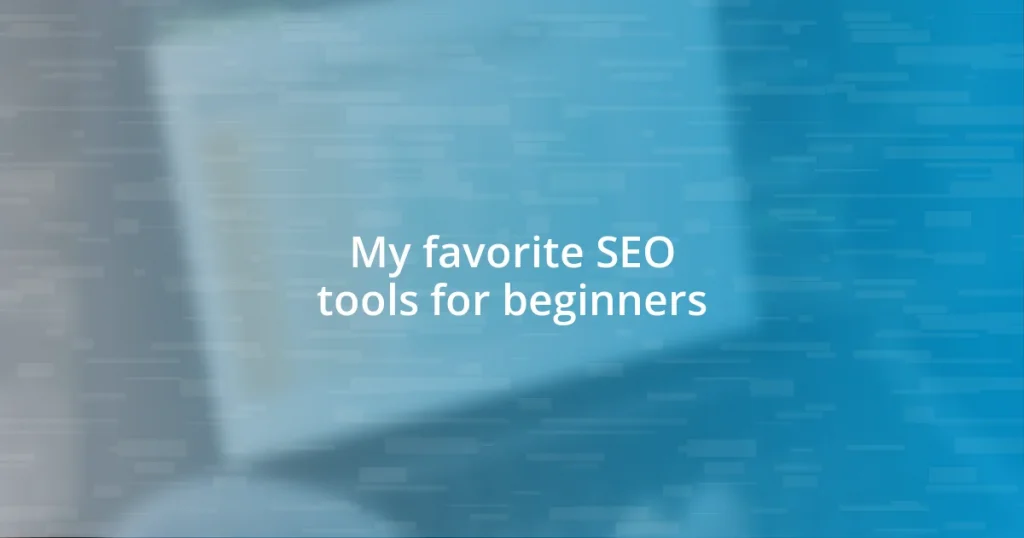Key takeaways:
- SEO tools are essential for beginners to optimize their online presence by driving organic traffic, building credibility, and fostering long-term growth.
- Key free tools like Google Search Console, Ubersuggest, and Screaming Frog SEO Spider enable users to analyze performance, conduct keyword research, and audit websites effectively.
- Integrating and utilizing multiple tools, along with regular review and organization, enhances the SEO process and allows for informed adjustments to strategies over time.
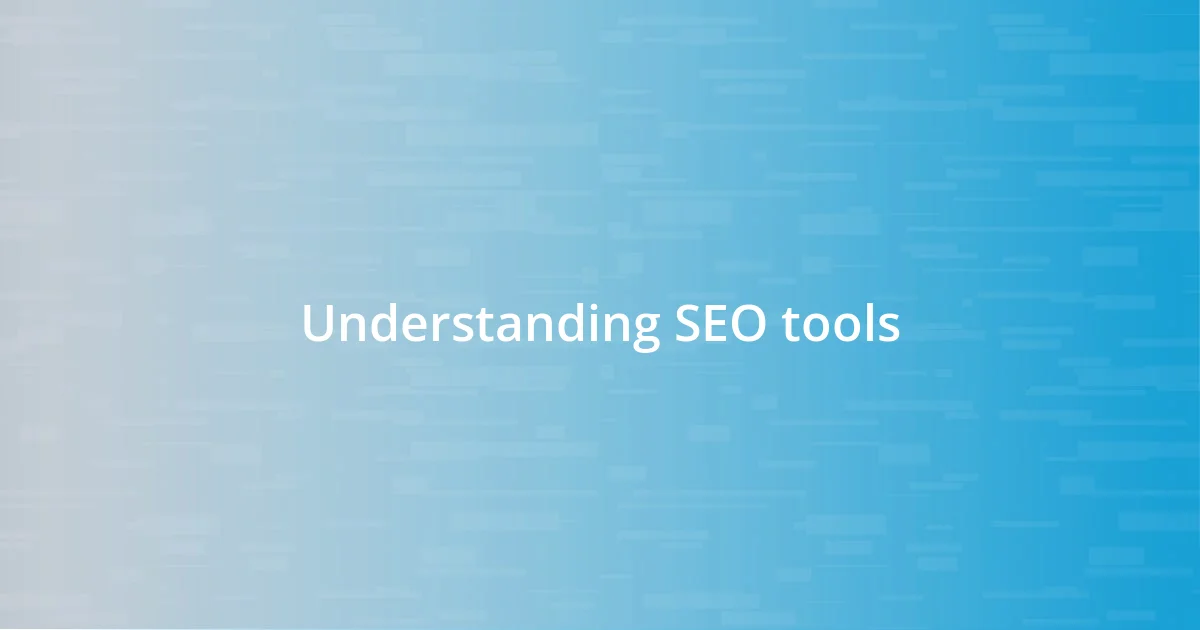
Understanding SEO tools
When I first ventured into the world of SEO tools, I was overwhelmed by the sheer variety available. How does one choose between dozens of options? Each tool offers unique features, from keyword research to site audits, catering to different aspects of search engine optimization.
Using SEO tools isn’t just about crunching numbers; it’s about gaining insights that can make or break your online presence. I vividly remember the moment I discovered a tool that revealed the keywords driving traffic to my site. It felt like finding hidden treasures, allowing me to pivot my content strategy effectively.
Moreover, understanding how to use these tools can significantly enhance your confidence in the SEO process. Have you ever felt lost when analyzing your site’s performance? I did in the beginning, but with practice and exploration, I learned to interpret the data meaningfully, transforming confusion into actionable strategies.
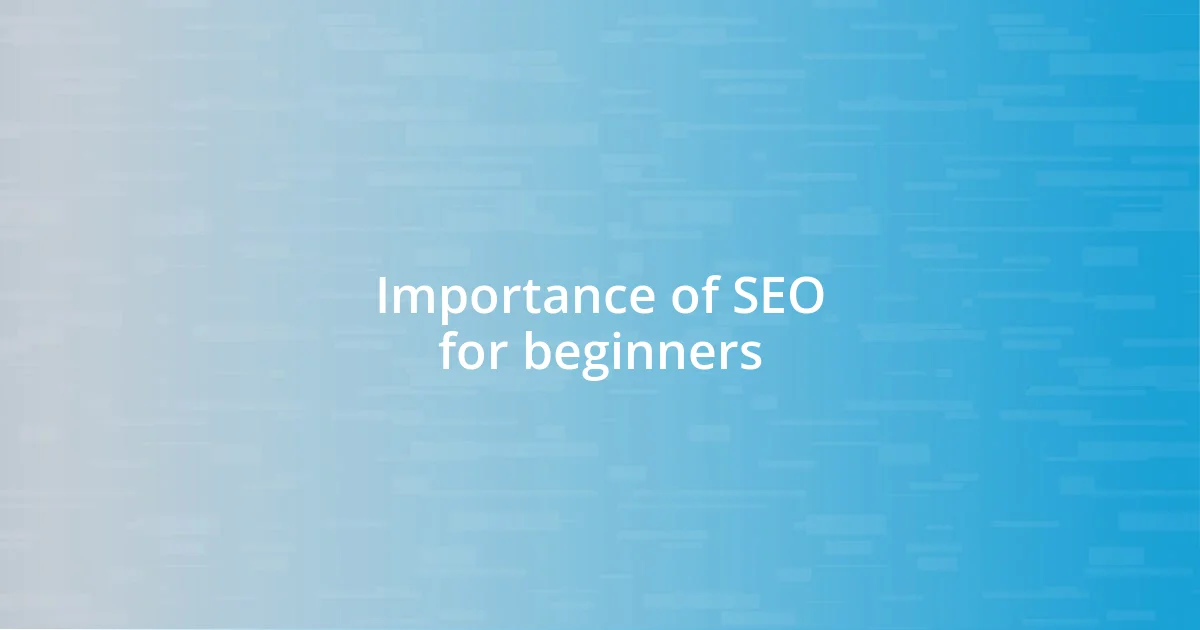
Importance of SEO for beginners
SEO is incredibly important for beginners because it lays the groundwork for successfully driving organic traffic to your website. When I started learning about SEO, I realized that even small changes could have a significant impact on my site’s visibility. It was a lightbulb moment for me; optimizing my content meant I could reach a wider audience without spending a dollar on ads.
Another reason SEO is crucial is that it helps build credibility and trust with your audience. In my early days, I remember writing great content, but it didn’t rank well in search results. I felt disheartened until I discovered how proper SEO practices could enhance my content’s authority. As I implemented these strategies, my audience began to grow, and I felt a sense of accomplishment in building a trustworthy online presence.
Finally, understanding SEO fosters long-term growth. Unlike fleeting social media trends, the benefits of good SEO work compound over time. I recall a period of patience where I didn’t see immediate results, which was frustrating. However, when my site finally began to climb the rankings, the satisfaction I felt was worth every ounce of effort. It taught me that diligent SEO practices have the potential to create a sustainable online presence.
| Importance of SEO | Impact on Beginners |
|---|---|
| Drives organic traffic | Increases website visibility without spending on ads |
| Builds credibility | Establishes trust with audience over time |
| Fosters long-term growth | Offers sustainable benefits that accumulate |
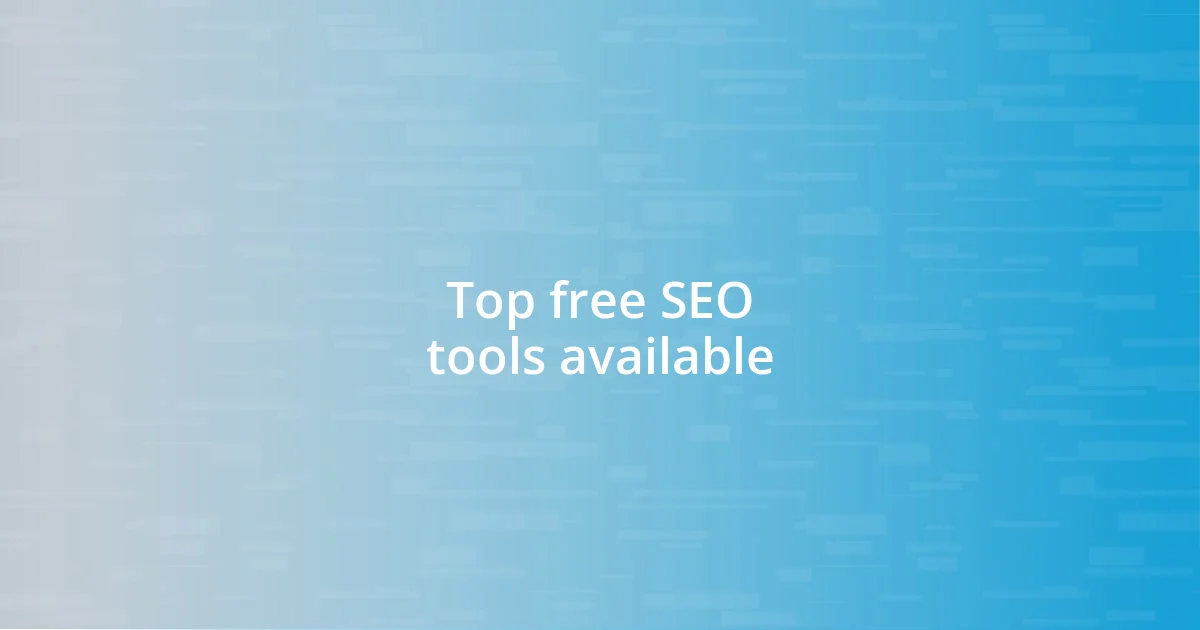
Top free SEO tools available
When I think about free SEO tools for beginners, a few gems immediately come to mind. These tools can be incredibly helpful in navigating your SEO journey without costing a dime. I remember feeling a rush of excitement when I first discovered Google Search Console. It offered me an eye-opening glimpse into how my site was perceived by search engines, revealing indexing issues I hadn’t even considered. Every fix felt like a mini victory, leading to tangible improvements in my rankings.
In terms of options, here are some top free SEO tools that I believe every beginner should consider:
- Google Search Console: Analyze your website’s performance and discover search queries that bring traffic.
- Ubersuggest: A user-friendly keyword research tool that provides insights into SEO strategies of competitors.
- MozBar: This browser extension allows you to view page authority and other metrics on the fly as you browse.
- AnswerThePublic: A fantastic resource for uncovering common questions and phrases people search for in relation to your content.
- Screaming Frog SEO Spider: A powerful tool that helps you audit your website by crawling URLs and analyzing SEO elements.
Using these tools not only refines your approach to SEO but also injects a sense of empowerment into the process. I still remember the first time I optimized a page based on a keyword suggestion from Ubersuggest; watching my traffic increase was a game-changer. It showed me how crucial these tools can be in tracking progress and identifying areas for improvement.

Key features to look for
When searching for SEO tools, one of the first features I recommend looking for is user-friendliness. In my early days, I struggled with complicated interfaces that made learning almost impossible. I still vividly remember the frustration of wanting to understand SEO concepts while navigating tools that felt like rocket science. A user-friendly tool empowers beginners to focus on learning rather than getting lost in technical jargon.
Another key feature to consider is the range of analytics offered. I recall feeling amazed when I discovered tools that provided in-depth insights into keyword performance and website traffic. These analytics were like a treasure map, guiding me to understand what worked and what didn’t. Having access to robust data means you can adapt your strategies quickly, which is essential for a beginner eager to make impactful changes.
Lastly, I believe integration capabilities are vital. Tools that seamlessly connect with your existing platforms or websites can be game-changers. I remember the relief I felt when I found tools that integrated with Google Analytics, allowing me to see all my data in one place. The ease of access streamlined my SEO efforts and helped me focus more on the content strategies that truly resonated with my audience. Have you experienced that feeling of efficiency when everything just clicks together? It’s incredibly satisfying!
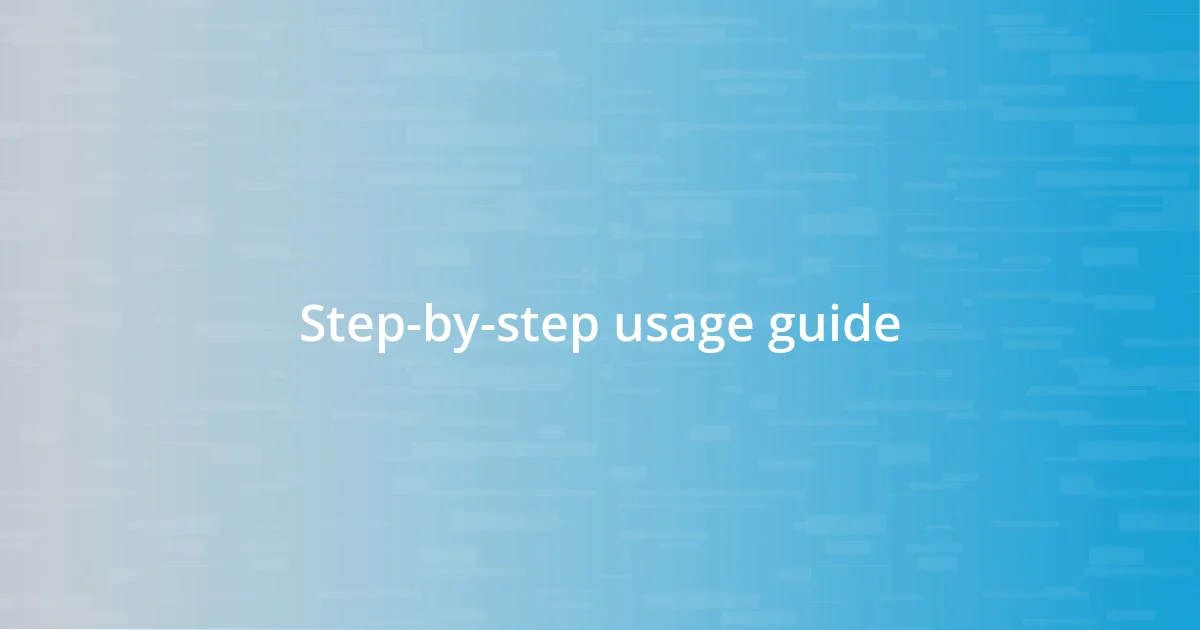
Step-by-step usage guide
To get the most out of any SEO tool, I recommend starting with a clear goal in mind. For instance, when I first used Google Search Console, I wanted to improve my site’s visibility. I took baby steps, initially focusing on just a few pages. It felt like I was piecing together a puzzle—thrilling yet challenging. As I uncovered indexing issues and started addressing them, I couldn’t help but feel a sense of accomplishment with each improvement.
Next, dive into Ubersuggest for keyword research. Initially, I was overwhelmed by the vast amount of data it presents. However, I remember focusing solely on the “Keyword Ideas” section at the beginning. I picked a handful of relevant keywords to target and created content around them. It was like discovering a secret passage that led to an increase in traffic, and that feeling is something every beginner should experience.
Finally, don’t skip the hands-on aspect with tools like Screaming Frog SEO Spider. When I first employed it, I was amazed at how easily it crawled my site. I noted the areas that needed optimization, and I still recall the thrill of seeing an SEO audit report that highlighted opportunities for improvement. Jumping in and crawling your own site can be an eye-opener—are you ready to uncover hidden gems on your website? It’s like turning over stones to find treasures waiting to be revealed.

Comparative analysis of tools
When comparing SEO tools, I found it crucial to assess their unique features side by side. For example, while Moz offers great keyword tracking, I remember how SEMrush blew my mind with its comprehensive competitive analysis. Evaluating how each tool’s strengths fit your specific needs can save you time and frustrations down the line—hasn’t that ever caught your attention?
Price is another element I frequently pondered when choosing the right tool. During my research, I came across tools ranging from free, basic functionalities to those with hefty subscriptions. It brings to mind my experience with Ahrefs; I was initially hesitant about the cost but was thrilled when I realized the depth of data and insights it provided, easily justifying the investment. Does that resonate with you when evaluating what’s worth the expense?
Lastly, the community and support systems around these tools often made a difference in my decision-making. I remember feeling overwhelmed by questions early on and was grateful for platforms that provided extensive tutorials and forums. Tools like Google Analytics felt less daunting because of the wealth of shared knowledge online. Have you ever found comfort in such a community when battling confusion? I know I did, and it truly made a world of difference in my learning journey.
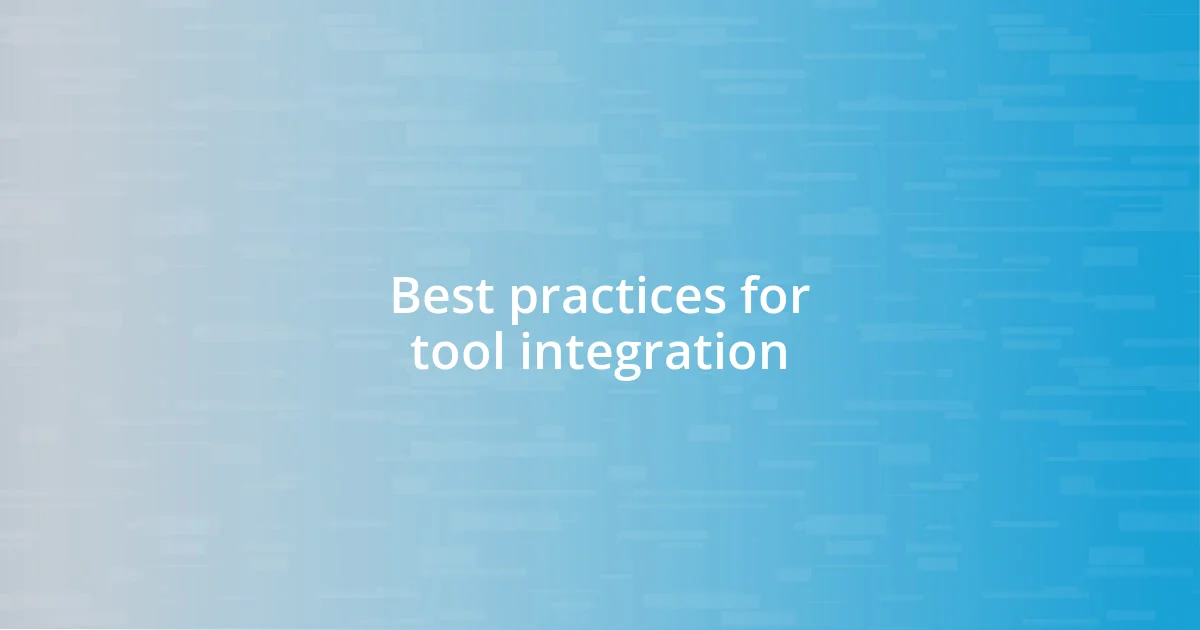
Best practices for tool integration
When integrating multiple SEO tools, it’s essential to ensure they complement each other. I remember the first time I synchronized Google Analytics with Ahrefs; it was a game-changer. By analyzing website traffic in conjunction with backlink data, I gained a holistic view of how my SEO efforts were performing. Have you ever felt that rush of clarity when everything clicks into place?
Another best practice is to create a structured plan for tool usage. I distinctly recall sitting down and mapping out which metrics I needed to track from different tools. It was like laying the groundwork for a personal SEO roadmap. This method not only kept me organized but also helped me avoid the confusion that can arise from juggling too many tools at once.
Lastly, never underestimate the power of regular reviews and updates. I learned this the hard way when I neglected to revisit my keyword strategy after initial implementation. Letting it drift felt like losing touch with my website’s potential. Now, I set aside time monthly to evaluate my analytics and adjust accordingly. Have you found that consistent reflection leads to better results? Trust me; it truly enhances your effectiveness over time.










